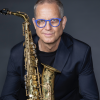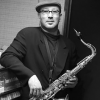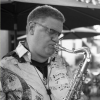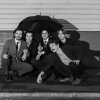Home » Jazz Musicians » Charlie Parker
Charlie Parker
The only child of Charles and Addie Parker, Charlie Parker was one of the most important and influential saxophonists and jazz players of the 1940’s.
When Parker was still a child, his family moved to Kansas City, Missouri, where jazz, blues and gospel music were flourishing. His first contact with music came from school, where he played baritone horn with the school’s band. When he was 15, he showed a great interest in music and a love for the alto saxophone. Soon, Parker was playing with local bands until 1935, when he left school to pursue a music career.
From 1935 to 1939, Parker worked in Kansas City with several local jazz and blues bands from which he developed his art. In 1939, Parker visited New York for the first time, and he stayed for nearly a year working as a professional musician and often participating in jam sessions. The New York atmosphere greatly influenced Parker's musical style.
In 1938, Parker joined the band of pianist Jay McShann, with whom he toured around Southwest Chicago and New York. A year later, Parker traveled to Chicago and was a regular performer at a club on 55th street. Parker soon moved to New York. He washed dishes at a local food place where he met guitarist Biddy Fleet, the man who taught him about instrumental harmony. Shortly afterwards, Parker returned to Kansas City to attend his father’s funeral. Once there, he joined Harlan Leonard’s Rockets and stayed for five months. In 1939, Yardbird rejoined McShann and was placed in charge of the reed section. Then, in 1940, Parker made his first recording with the McShann orchestra.
During the four years that Parker stayed with McShann's band, he got the opportunity to perform solo in several of their recordings, such as Hootie Blues, Sepian Bounce, and the 1941 hit Confessing the Blues. In 1942, while on tour with McShann, Parker performed in jam sessions at Monroe’s and Minton’s Playhouse in Harlem. There he caught the attention of up-and-coming jazz artists like Dizzy Gillespie and Thelonious Monk. Later that year, Parker broke with McShann and joined Earl Hines for eight months.
The year 1945 was extremely important for Parker. During that time he led his own group in New York and also worked with Gillespie in several ensembles. In December, Parker and Gillespie took their music to Hollywood on a six-week nightclub tour. Parker continued to perform in Los Angeles until June 1946, when he suffered a nervous breakdown and was confined at a state hospital. After his release in January 1947, Parker returned to New York and formed a quintet that performed some of his most famous tunes.
Read moreTags
Phil Schaap: Talking Technology and More

by Marshall D Katzman
This article was transcribed from a March 21, 2021 interview on the Mister Radio Podcast . Marshall Katzman: You're listening to Mister Radio, and I'm your host, Marshall. Today's guest has won six Grammy Awards and eight Grammy nominations, including an award for Best Album Notes for Bird, the complete Charlie Parker on Verve. Frank Foster has called him a walking jazz history book. Early in his career, he managed the Basie alumni band, The Countsmen, and for ...
Continue ReadingCharlie Parker, Dizzy Gillespie, Bud Powell, Charles Mingus, Max Roach: Hot House: The Complete Jazz at Massey Hall Recordings

by Richard J Salvucci
This is the stuff of legend, one for the ages. It all started here; the greatest jazz concert of all time. How many times has the Massey Hall Concert (Toronto, 1953) been described that way? For the average All About Jazz reader, Massey Hall happened before he or she was born. Besides, there were other famous jazz concerts such as The Carnival of Swing (Randall's Island, NY, 1938), Benny Goodman's 1938 Carnegie Hall Concert (that remained unreleased until 1958), Gene ...
Continue ReadingDizzy Gillespie & Charlie Parker: Live Revisited

by Chris May
The first six tracks on this album, which were recorded at New York City's Town Hall on June 22, 1945, are amongst the most exciting in the jazz compendium. Not only because of their intrinsic artistic merit but also because they mark one of the first, if not the first, occasion the vanguard of the bop revolution emerged from the basements of 52nd Street, equipped with a fully formed manifestation of the new music, on to a stage bigger than ...
Continue ReadingCharlie Parker: At Birdland 1950 Revisited

by Chris May
When it comes to live recordings of Charlie Parker, Jazz At Massey Hall, from a concert in Toronto in May 1953, has been widely considered the slam-dunk number one ever since Charles Mingus released it on his Debut label in 1956. Forensicists might favour the 7-CD The Complete Dean Benedetti Recordings Of Charlie Parker (Mosaic, 1990), but for most people, Massey Hall takes pole position. There have, however, been challengers for the top spot. Prominent among them ...
Continue ReadingVarious Artists: The Birth of Bop

by Richard J Salvucci
Someone famously called jazz the sound of surprise, but all too often, what is on offer is the dull hum of routine. Or something like that. This historic reissue is, however, anything but routine. This is not the first time that Teddy Reig's Savoy sides have been reissued (was he also the mysterious Buck Ram listed as producing one track?), but Craft Recordings took a lot of trouble to produce this very fine selection. If a listener were, ...
Continue ReadingBebop, Beats, and the Drive of Beat Literature

by Arthur R George
"Mulberry-eyed girls in black stockings, Smelling vaguely of mint jelly and last night's bongo drummer... fling their arrow legs / To the heavens / Losing their doubts in the beat" of jny: San Francisco nights, announced poet Bob Kaufman's “Bagel Shop Jazz." (Solitudes Crowded with Loneliness, New Directions Publishing, 1965; Collected Poems of Bob Kaufman, City Lights, 2019) “Angelheaded hipsters burning for the ancient heavenly connection to the starry dynamo in the machinery of night,.. floating across the tops of ...
Continue ReadingCharlie Parker: Remastered Highlights From His Peak Years

by Chris May
Charlie Parker's recorded legacy has been repackaged, reissued, reshuffled and refried so often that newbies and connoisseurs alike are spoilt for choice. Parker's oeuvre has not been meaningfully remixed, however, due to the technical constraints attached to late 1930s through early 1950s recordings--but much of it has been remastered, sometimes with excellent results. Not one of the remastered collections released since digitization, however, delivers the splendiferous sonics of four Celebrating Bird At 100 discs released by the Swiss-based ezz-thetics label ...
Continue ReadingLiberation Hall Announces Bossa Nova And Charlie Parker Titles For Record Store Day, Saturday, April 22

Source:
Prime Mover Media
CHARLIE PARKER – The Long Lost Bird Live Afro-CuBop Recordings VARIOUS ARTISTS – Bossa Nova at Carnegie Hall Liberation Hall today details a pair of jazz vinyl releases for Record Store Day, the annual retail event which celebrates independent record stores in the U.S. and abroad. Record Store Day is set for Saturday, April 22. Bossa Nova at Carnegie Hall and Charlie Parker’s The Long Lost Bird Live Afro-CuBop Recordings will each arrive on 180-gram vinyl. Both titles will ...
read more
Craft Recording Celebrates the Enduring Legacy of Savoy Records and the Revolutionary Bebop Era with 'The Birth of Bop'

Source:
DL Media
Featuring Painstaking Recreations of the Five 10-Inch LP Compilations That Were Originally Released by Savoy in 1952 and 1953, This Collection Includes 30 Newly Remastered Tracks Spanning 1944–1949 Craft Recordings proudly celebrates the legacy of Savoy Records with an all-new collection that chronicles the groundbreaking era of bebop (or bop) music. An essential introduction to this vital period in jazz music, The Birth of Bop: The Savoy 10-Inch LP Collection features 30 choice cuts from many of the genre’s pioneers, including Charlie Parker, Dexter Gordon, Stan Getz, Milt Jackson, Allen Eager, Fats Navarro and more. Spanning 1944 ...
read more
Jazz Musician of the Day: Charlie Parker

Source:
Michael Ricci
All About Jazz is celebrating Charlie Parker's birthday today!
The only child of Charles and Addie Parker, Charlie Parker was one of the most important and influential saxophonists and jazz players of the 1940’s. When Parker was still a child, his family moved to Kansas City, Missouri, where jazz, blues and gospel music were flourishing. His first contact with music came from school, where he played baritone horn with the school’s band. When he was 15, he showed a great ...
read more
Phil Schaap (1951-2021)

Source:
JazzWax by Marc Myers
Phil Schaap, a jazz know-it-all, nudnik and tireless fact finder who put all of those skills to work to become one of radio's finest and most passionate jazz authorities, detectives and educators, died on September 7. He was 70. [Photo above of Phil Schaap at WKCR in 1991 by John Abbott, courtesy of John Abbott] Phil was best known in the New York City area for his daily weekday Bird Flight shows that came on before you woke up and ...
read more
Jazz Musician of the Day: Charlie Parker

Source:
Michael Ricci
All About Jazz is celebrating Charlie Parker's birthday today!
The only child of Charles and Addie Parker, Charlie Parker was one of the most important and influential saxophonists and jazz players of the 1940’s. When Parker was still a child, his family moved to Kansas City, Missouri, where jazz, blues and gospel music were flourishing. His first contact with music came from school, where he played baritone horn with the school’s band. When he was 15, he showed a great ...
read more
Documentary: Bird in K.C.

Source:
JazzWax by Marc Myers
Charlie Parker was born in Kansas City, Kan., in 1920. When he was 7, his family moved to Kansas City, Mo. In fifth grade, Parker began playing the saxophone in school after the city put in force a music-education program. As he progressed, his mother bought him an alto saxophone in a pawn shop for $40. At the time, vice thrived in Kansas City. Despite Prohibition, the city's mayor and bosses allowed virtually everything that was illegal elsewhere to be ...
read more
Jazz Musician of the Day: Charlie Parker

Source:
Michael Ricci
All About Jazz is celebrating Charlie Parker's birthday today!
The only child of Charles and Addie Parker, Charlie Parker was one of the most important and influential saxophonists and jazz players of the 1940’s. When Parker was still a child, his family moved to Kansas City, Missouri, where jazz, blues and gospel music were flourishing. His first contact with music came from school, where he played baritone horn with the school’s band. When he was 15, he showed a great ...
read more
Charlie Parker at 100: Part 5

Source:
JazzWax by Marc Myers
This week, I've been celebrating Charlie Parker's centenary on August 29 by posting on the alto saxophonist's five major contributions to jazz and the culture at large. In Part 1, I posted about Parker's invention, with Dizzy Gillespie, of bebop in 1945. In Part 2, I posted on Parker's popularization of high-speed improvisation. In Part 3, I posted on how Parker turned the blues into a seductive, lyrical form. And in Part 4, I posted on Parker's pioneering albums with ...
read more
Charlie Parker at 100: Part 4

Source:
JazzWax by Marc Myers
This week, I'm celebrating Charlie Parker's upcoming centenary on August 29 by posting on what I believe are the alto saxophonist's five major contributions to jazz and the culture in general. In Part 1, I posted about Parker's invention of bebop with Dizzy Gillespie in 1945. In Part 2, I posted on Parker's popularization of high-speed improvisation. In Part 3, I posted on how Parker turned the blues into a seductive, lyrical form. Today, I'm posting on how Parker became ...
read more
Charlie Parker at 100: Part 3

Source:
JazzWax by Marc Myers
In celebration of Charlie Parker's centenary on August 29, I'm spending the week posting on five major accomplishments by the alto saxophonist. On Monday, I posted about Parker's invention with Dizzy Gillespie in 1945 of a transformative genre of improvised jazz that became known as bebop. On Tuesday, I posted about Parker's popularization of high-speed and complex improvisation. Today, I'm looking at Parker's unique ability to make the blues charismatic and seductive with his round tone and fluidity. In the ...
read more



































































































.jpg)






























































































































































